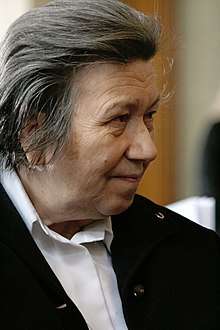Ute Bock
| Ute Bock | |
|---|---|
 | |
| Born |
27 June 1942 Linz |
| Died |
19 January 2018 Vienna |
Ute Bock (27 June 1942[1] – 19 January 2018)[2] was an Austrian educator who was known for her projects helping asylum seekers. In Vienna, there was the campaign Bock auf Bier [3] in which a small percentage of the price of the beer (the price was increased) was earmarked to Bock—who gave therewith asylum seekers a home.
Biography
Bock was born in Linz. After graduation she spent a year in private industry before she decided to be an educator. In 1969, she obtained work at the Gesellenheim Zohmanngasse in Favoriten, the 10th District of Vienna. In 1976 she was eventually appointed as director. In the early 1990s the youth welfare office increasingly sent foreign youth to Ute Bock's facility, these were also cumulative clients who had already been turned away by other facilities. At that time Ute Bock began to occupy herself with the fate of these people and began to be involved in helping asylum seekers.
In 1999, during a raid on the centre, about 30 young Africans were arrested for drug trafficking offences under the controversial Operation Spring, and Ute Bock was charged with banditry and drug trafficking, too. This led to her being temporarily suspended from duty. Later the charges were dropped, though she was forbidden to accommodate other African asylum seekers in the Zohmanngasse. She then organised private residential communities, which she self-funded and supervised. In 2000 she retired but she continued working on her project. Meanwhile, there are over 350 asylum seekers who find accommodation and board in Ute Bock's organised apartments. Another 1,000 homeless asylum seekers have their mailing address at the Association Ute Bock. In addition, she made legal advice available to her clients. It relies on donations. She died in Vienna, aged 75.
Movies
On October 31, the documentary Bock for President has been shown for the first time as a preview in cooperation between Stadtkino and Viennale during the 2009 student protests in Austria in the winter of 2009 in the occupied lecture hall of the University of Vienna. The official premiere took place as part of the Viennale at the Künstlerhaus-cinema on November 1, in the Austrian cinemas the film was shown on January 15, 2010. In 2010, Houchang Allahyari dedicated himself to Ute Bock's life again with another film project. In the feature film Die verrückte Welt der Ute Bock (The crazy world of Ute Bock) Josef Hader, Karl Markovics, Viktor Gernot, Andreas Vitasek, Julia Stemberger, Dolores Schmidinger, Peter Kern and Alexander Pschill are taking part. Shown are the work of Bock, who can also be seen in the film, and the stories of people with whom she meets, from the refugees, who play themself, to the police. The film came out in Austria November 2010.
Awards
Bock won several awards for her social implication.
- 1999: Ute Bock Award for Moral Courage Zivilcourage[4]
- 2000: UNHCR-Refugee-Award
- 2002: Bruno Kreisky Award
- 2003: Karl Renner Prize and Greinecker Seniorenpreis
- 2005: One of the five Austrian women, who were selected for the project PeaceWomen Across the Globe2007
- 2007: International Human Award
Publications
- with Cornelia Krebs (Hrsg.): Ute Bock. Die Geschichte einer Flüchtlingshelferin. Wien: Molden, 2010, ISBN 978-3-85485-268-1.
References
- ↑ https://austria-forum.org/af/Biographien/Bock%2C_Ute
- ↑ https://m.kurier.at/chronik/wien/ute-bock-ist-gestorben/307.354.256
- ↑ Bock auf Bier is a slang expression for Wanting a beer, but there is also a double meaning in this phase, as Bock Beer stands for a specially strong beer
- ↑ SOS Mitmensch: Der Ute Bock Preis für Zivilcourage Archived 2007-10-28 at the Wayback Machine.
- ↑ 1. Weltmenschpreis 2007
External links
| Wikimedia Commons has media related to Ute Bock. |
- Ute Bocks Website
- Bock auf Kultur Benefizveranstaltungen
- Bock Ma's Benefizfestival des Kulturverein Sozialforum Freiwerk für den Verein von Ute Bock
- fraubock.tv Videopodcast rund um die Person und den Verein Ute Bock
- Kein Bock auf Mama Interview mit Ute Bock im Magazin Bob
- Die Kino-Dokumentation über Ute Bock